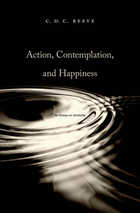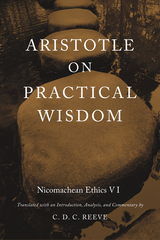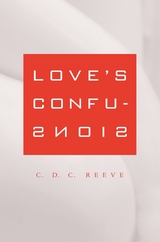
The notion of practical wisdom is one of Aristotle’s greatest inventions. It has inspired philosophers as diverse as Martin Heidegger, Hans-Georg Gadamer, Elizabeth Anscombe, Michael Thompson, and John McDowell. Now a leading scholar of ancient philosophy offers a challenge to received accounts of practical wisdom by situating it in the larger context of Aristotle’s views on knowledge and reality.
That happiness is the end pursued by practical wisdom is commonly agreed. What is disputed is whether happiness is to be found in the practical life of political action, in which we exhibit courage, temperance, and other virtues of character, or in the contemplative life, where theoretical wisdom is the essential virtue. C. D. C. Reeve argues that the dichotomy is bogus, that these lives are in fact parts of a single life, which is the best human one. In support of this view, he develops innovative accounts of many of the central notions in Aristotle’s metaphysics, epistemology, and psychology, including matter and form, scientific knowledge, dialectic, educatedness, perception, understanding, political science, practical truth, deliberation, and deliberate choice. These accounts are based directly on freshly translated passages from many of Aristotle’s writings. Action, Contemplation, and Happiness is an accessible essay not just on practical wisdom but on Aristotle’s philosophy as a whole.

Nicomachean Ethics VI is considered one of classical philosophy’s greatest achievements. Aristotle on Practical Wisdom is the first full-scale commentary on this work to be issued in over a century, and is the most comprehensive and philosophically illuminating to date. A meticulous translation coupled with facing-page analysis enables readers to engage directly with the account of phronêsis or practical wisdom that Aristotle is developing, while a full introduction locates that account in the context of his ethical thought and of later ethical thought more generally. The commentary discusses the text line by line, illuminating obscure passages, explaining technical ones, and providing a new overall interpretation of the work and the nature of practical reason.
A companion volume, Action, Contemplation, and Happiness, expands on this interpretation to provide a startling new picture of Aristotle’s thought as a whole. Although the two books can be approached separately, together they constitute one of the most daring and original contemporary readings of Aristotle’s philosophy. Aimed at committed students of these notoriously difficult writings, C. D. C. Reeve’s engaging and lucid books should find a wide audience among philosophers, classicists, and all readers willing to wrestle with a thinker of unparalleled subtlety, depth, and scope.

Love's confusions are legion. We promise to love, but we cannot love at will. Love God, we're commanded, but we cannot love on command. And given the vicissitudes of self-love, even if we could love our neighbors as we love ourselves, would it be a good thing to do so? These are a few of the paradoxes that typically lead philosophers to oversimplify love--and that draw C. D. C. Reeve to explore it in all its complexity, searching for the lessons to be found within love's confusions.
Ranging from Plato, who wrote so eloquently on the subject, to writers as diverse as Shakespeare, Proust, Forster, Beckett, Huxley, Lawrence, and Larkin, Reeve brings the vast resources of Western literature and philosophy to bear on the question of love. As he explores the origins of Western thought on the subject, he also turns to the origins of individual experience--the relationship of mother and child, the template of all possible permutations of love--and to the views of such theorists as Freud, Melanie Klein, and Carol Gilligan. At the same time, he uses the story of the prototypical absent father, Odysseus, to demonstrate the importance of reconciling a desire for tenderness with a desire for strength if we are to make the most of love's potentials.
Looking at love in light of the classical world and Christianity, and in its complex relationship with pornography, violence, sadomasochism, fantasy, sentimentality, and jealousy, Reeve invites us to think more broadly about love, and to find the confusions that inevitably result to be creative rather than disturbing.

READERS
Browse our collection.
PUBLISHERS
See BiblioVault's publisher services.
STUDENT SERVICES
Files for college accessibility offices.
UChicago Accessibility Resources
home | accessibility | search | about | contact us
BiblioVault ® 2001 - 2024
The University of Chicago Press









